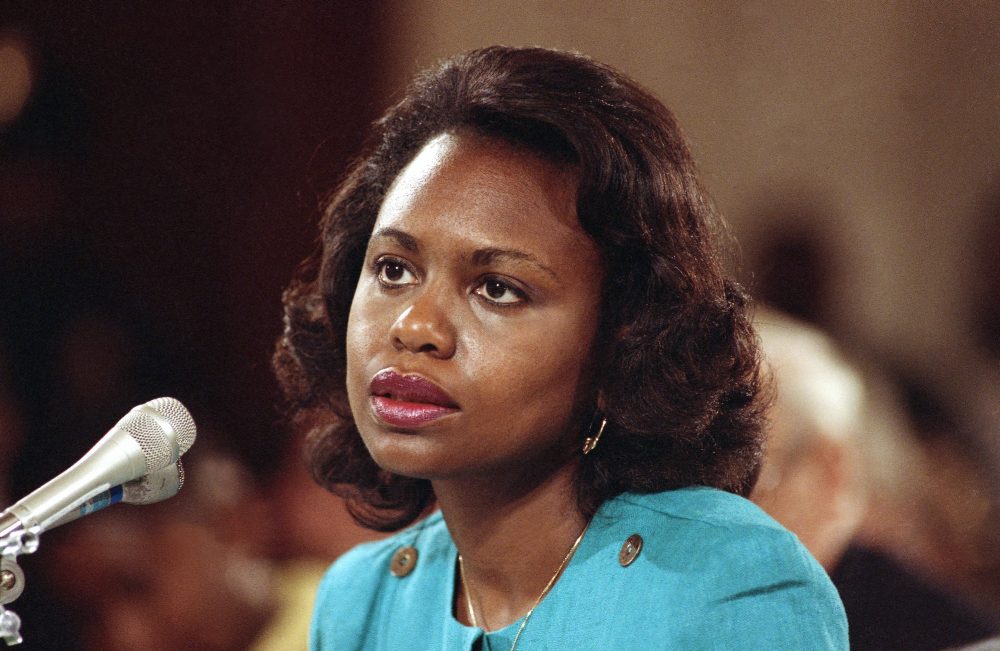Advertisement
Anita Hill On Trump's Comments About Women, And Our Reactions To Them
Resume
Donald Trump's lawyers said they will "pursue all available actions and remedies" against The New York Times if the paper does not retract its report about multiple women who say Trump sexually assaulted them.
The Times quotes Rachel Crooks, who said Trump forcibly kissed her in 2005, and Jessica Leeds, who said Trump assaulted her by groping her breasts and under her skirt on an airplane flight 30 years ago.
The Times stands by its reporting. Trump's lawyers call the claims "defamatory" and "malicious," and "politically-motivated" because, his lawyers assert, the victims waited decades before coming forward.
That kind of backlash is sadly familiar to Anita Hill. Twenty-five years ago, she revealed that Clarence Thomas had sexually harassed her and testified about Thomas' conduct before the Senate Judiciary Committee during Thomas' Supreme Court confirmation hearings.
"As if being a target of harassment wasn't bad enough," Hill writes in a Boston Globe op-ed this week, "I was then victimized a second time by a smear campaign meant to protect the nomination."
On Why She's Speaking Out
"Because I want us to think about this not simply as a political issue but as an issue that involves real life women and some men, in terms of sexual assault. And that we need to humanize this experience. In order to do that, we need to think about it from the point of view of women who have experienced sexual assault or been threatened with sexual assault.
"The problem is still happening; Sexual assault on campus is in particular is a huge problem and we're just becoming aware of the extent of the problem. How does it feel? It feels very painful. There's this new Twitter campaign that Kelly Oxford has introduced and she gets women who are talking about how their sexual assault felt to them, what it was like to be assaulted. Some women like herself, as early as twelve years old, or even younger for some.
"I think more of those stories getting out will help us understand the real pain that women go through. I have heard from thousands of women in the past twenty-five years. And some get beyond the experience through a lot of work and a lot of effort on their part, but no one forgets how awful it is."
On If She Thinks There's National Damage From Trump's Remarks
"I clearly think the individual harm, that is the most important thing we have to reckon with. But yes, there is injury to us as a society and really, we need to think about what it says about us as a society. One of the things I think we haven't given enough thought to is: We say we value women, but in these situations, in essence when we deny their harm and their experience or reduce it to minimal, we really are saying that these powerful men who are around them in the workplace or in their schools, are more important than these women. And that is really a very very harmful message to young girls, but it's harmful to all of us. And I think it does injury to us as a society."
On Her Message To Young Men
"Fortunately, we are in a place in society where men are actually stepping up and saying the language that was on that [leaked Trump] tape is not 'locker room banter' for one thing — it's not routine for men to speak in this way. So that kind of normalization has actually been reduced and made less effective by men stepping up and saying, no, we don't talk like this. Secondly, I think one of the things we have to also deal with is the bystander. In many ways we use the term 'bystander' and say, 'Well, you stood by, you said nothing,' and I think we may even need to rethink that term. Instead of thinking of people as bystanders — you look at the role Billy Bush played on that tape — he was actually an enabler... We need to take these lessons and all the stories that are coming in around the country and start to develop policies. I've been around these issues long enough to know that women are skeptical about coming forward. If we're going to allow excuses like 'locker room banter' to support denials of harm, then we can understand why women are skeptical."
On If It's Disappointing To See This Still Happening Today
"Absolutely it is disappointing. But we've come far enough that there was really a collective public outrage at the language [in the leaked Trump tape] and I think that even the ways of excusing it have caused more public anger and response... This can be a turning point. If we really invest in listening to the stories and viewing this as a problem from the point of view of people who have been victimized by it, I think we can begin to establish better policies and procedures that will allow women to come forward, that will assure them the process works, and finally, this is important, that the punishment will fit the offense. And all of those three things have to be taken into account if we're going to move on the issues that are confronting us throughout society."
Guest
Anita Hill, professor of social policy, law and women's, gender and sexuality studies at Brandeis University.
This segment aired on October 13, 2016.

